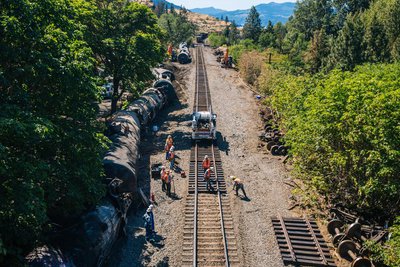
A month after the oil train fire in Mosier along the Columbia River, activist groups such as 350 Eugene are upset with the government’s lack of progress and accountability for oil train accidents.
In 2008, Congress passed the Rail Safety Improvement Act, which called for stricter railroad safety regulations to be implemented by the end of 2015. The new regulations have not been met; Congress extended the deadline to 2018.
On June 3, 16 oil tanker cars derailed near the small Oregon town of Mosier, and four of them caught fire. Mosier School and between 60 and 70 homes were evacuated.
The Federal Railroad Administration (FRA) investigated the accident and found that the derailment was caused by broken lag bolts. The FRA’s Office of Research and Development simulated the conditions of the derailment and found that if the train had been equipped with electronically controlled pneumatic (ECP) brakes two fewer tank cars may have derailed and one less tank car might have been punctured.;
“They left it up to the Federal Railroad Administration,” 350 Eugene volunteer Jim Neu says, “which is like putting the fox in charge of the hen house.”
Earlier this month on the third anniversary of the Lac-Mégantic oil train explosion that killed 47 people, 350 Eugene hosted a vigil and procession through downtown Eugene as a part of the “Stop Oil Trains Week of Action.”
Oil trains pass through Eugene at least once a week, according to 350 Eugene. The DOT recommends a half mile evacuation radius for train derailments and a one mile blast radius for oil train fires, according to the 2012 Emergency Response Guidebook authored by the Pipeline and Hazardous Materials Safety Administration.
The University of Oregon, Sacred Heart Medical Center and other businesses, schools and residents are within the potential blast radius. There are 284 Oregon schools and a total of over 100,000 students in blast zones, according to a report from advocacy group Stand.
“All of these hardworking people are in danger when this product runs through their livelihood, and it can wipe them out in a matter of seconds,” Neu tells EW.
On July 14, members of Oregon’s congressional delegation, including representatives Peter DeFazio, Greg Walden and Earl Blumenauer, introduced the Community Protection and Preparedness Act, which would increase inspections, phase out older and more dangerous railcars and protect communities.
Also last week, Oregon senators Jeff Merkley and Ron Wyden introduced legislation that would force the National Transportation Safety Board (NTSB) to investigate every major train derailment and reduce the amount of volatile gases in the transported crude oil.
“The communities along these train routes shouldn’t be on the hook for clean up or damages after an accident and spill occurs,” Congressman Peter DeFazio said in a statement.
This story has been updated.